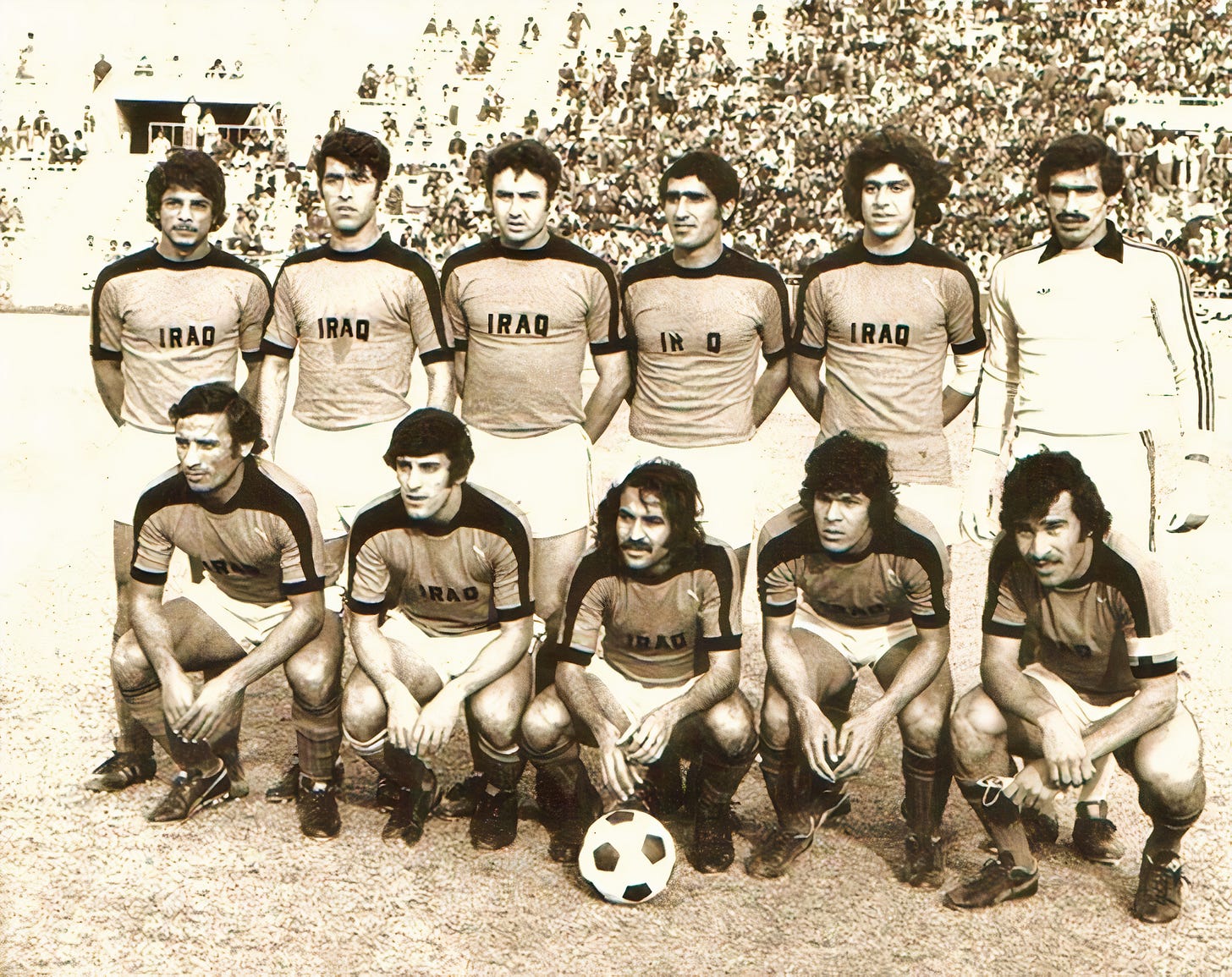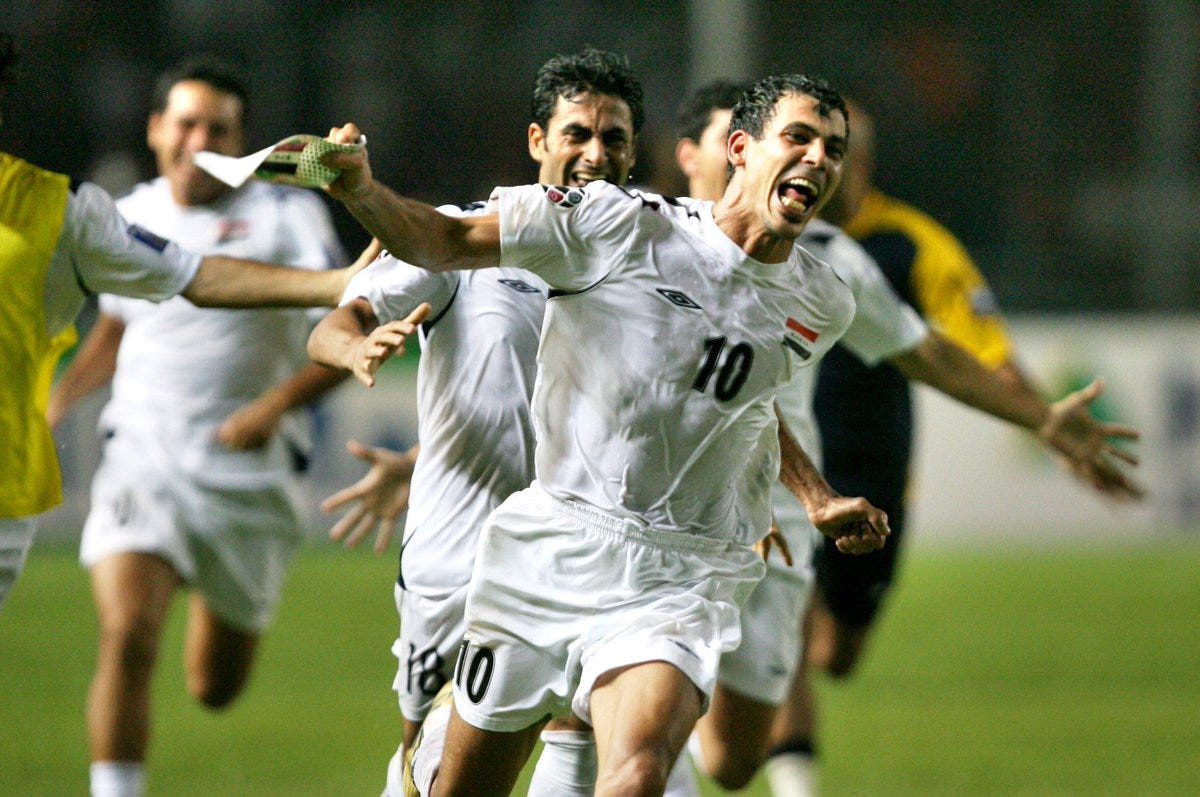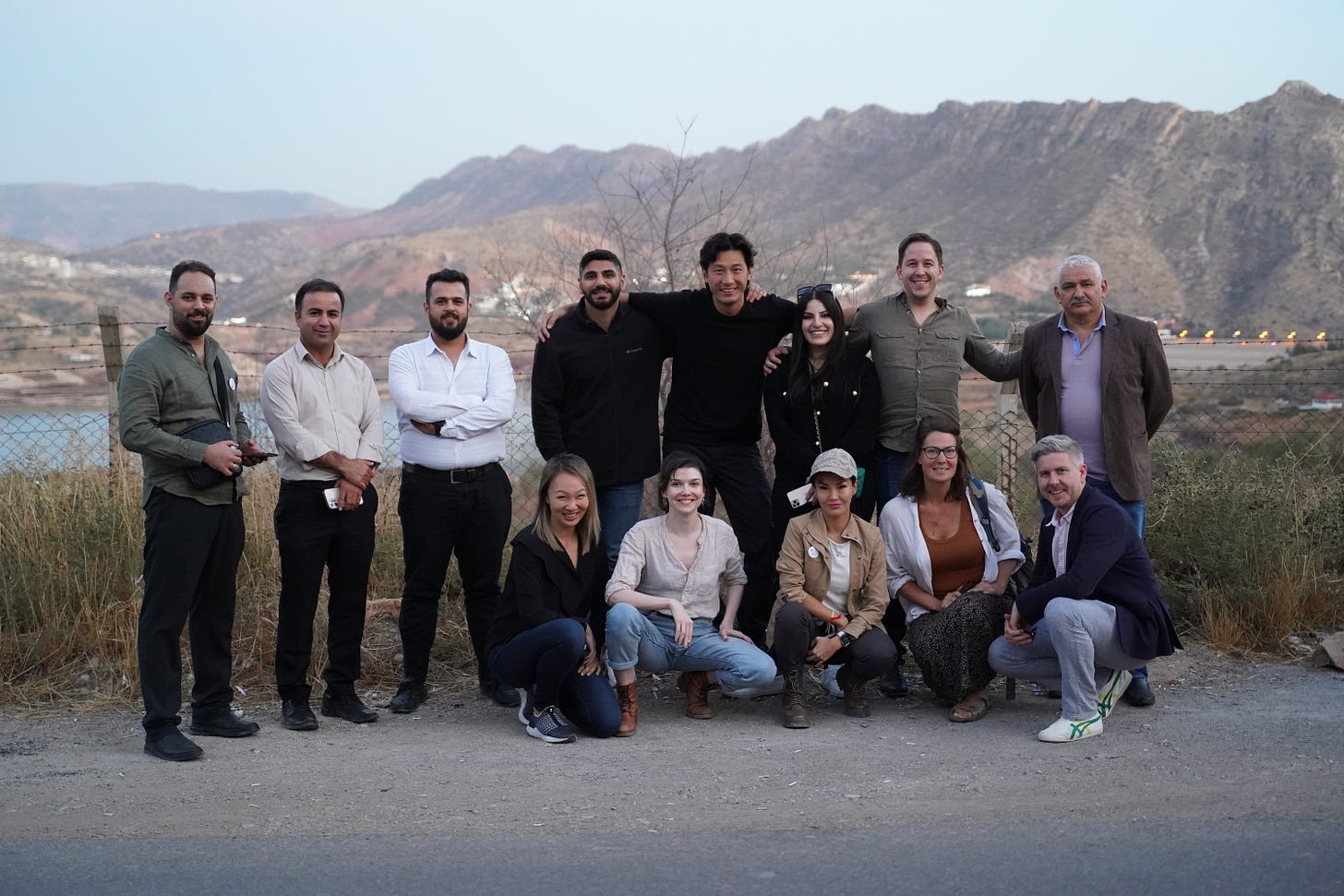How Football Might Prevent Iraq's Next Civil War
As chaos enveloped our homeland, football was one of our only sources of hope. To coalesce around a shared love for something rather than fight over what divides us is a powerful tool.
With an estimated 3.5 billion fans around the world, football has always played an important role in international politics. The game contributed to war breaking out between El Salvador and Honduras in 1970, as well as in aggravating relations between Egypt and Algeria in 2009. But football in Iraq has always played a positive political role for the country. Football has the power to bring people together or tear them apart. Iraq’s history is a shining example of the sport’s potential to unite people despite seemingly irreconcilable differences.
In 2007 the Iraqi national team won the AFC Asian Cup championship game by defeating Saudi Arabia 1-0 in the final match. The team consisted of Iraqi nationals from varying ethnic and religious backgrounds; Christians, Turkmen, Kurds, Sunni, and Shiite Arabs played together and won. This diverse group of men worked together in the spirit of one team and homeland while simultaneously, a sectarian war broke out. In Iraq, while dead bodies were being thrown in the streets of Baghdad, the players kept playing. In times of war, one should always appreciate the power of a positive distraction.
The Iraqi national football team and its players contributed to mitigating the ongoing internal conflicts in the region. The team represented a beacon of hope amongst the rubble that people might peacefully coexist– even work together towards a common goal, despite stark differences. Shortly after the Asian Cup, the civil war ceased due to the direct influence of the Iraqi national football team. They led by example, showing Iraqis and the world the importance of popular unity and acceptance of others. The team’s bond strengthened the fabric of society in Iraq. On the evening of July 29, 2007, the streets of Baghdad were filled with the sound of gunfire. On this rare occasion, however, the gunfire marked a collective celebration of the heroic victory brought about by the Iraqi national team. The streets were filled with the sounds of immense joy.
For the first time in our lives, we felt proud to be Iraqis as we watched the national team play together. For teenagers at the time, the Iraq War and the civil war that followed marked a defining period in our lives. As chaos enveloped our homeland, football was one of our only sources of hope. We watched as the Iraqi national identity fell and fractured in front of our eyes. People clung to their sectarian and religious identities as defining characteristics that trumped all else, but for those 90 minutes, Iraqis put our differences aside and cheered on our national team.
Despite more than 20 years of constant conflict, Iraqis never lost our collective soul or identity as hospitable people. Prior to the Asian Cup, I saw with my own eyes the owners of restaurants refusing to accept payments from visitors from Arab Gulf countries. One taxi driver refused to accept the fare from a Kuwaiti passenger. A man from the Sultanate of Oman was denied service by a street vendor selling coffee. Later that same street vendor also refused service to an Omani visitor. It was commonplace for militias to claim to represent a particular sect in order to discriminate against and, in some cases, kill those who hailed from different parts of the world or practiced another religion. Football offered an opportunity for Iraqis to be more accepting of tourists and people of different backgrounds; more than 55,000 Arabs visited Iraq from various gulf countries. Iraqis received their Arab siblings with a sense of humble hospitality that has become a well-known custom Iraqis are now proud of.
Football continued its positive political role in Iraq after the Arab Gulf Cup Federation issued its decision to hold the Arab Gulf Cup in Basra. Held periodically under the name of the Gulf Cup, the football tournament strengthened Arab bonds and reinforced a sense of national belonging for all Iraqis. In addition, the people from the northern regions of Iraq (Kurds) arrived in Basra to show their support for the Iraqi national team. This put forward a positive image of the country and its citizens. Young Basrans felt a sense of pride and joy as Iraqis of all stripes flooded into the city for the tournament. They were happy their Arab brothers and sisters were present. These positive feelings were shared by all the residents of Basra, who felt charged with a sense of patriotic duty to show benevolent generosity to everyone who visited the province.
The Iraqi football team, residents of Basra, southern Iraqis, Kurds, Sunnis, and Shiites all came together for a common love of the sport. For a moment, everyone put their differences aside to put Iraq’s best foot forward. To coalesce around a shared love for something rather than fight over what divides us is a powerful tool, one compelling enough to move the needle toward peace. The Arab Gulf countries with their flags flying alongside one another played a significant role in delivering the message to the world that they came to Iraq to support the Iraqis. This unity may have been brief, but it was beautiful. We can no longer afford to be disconnected from our region and the people of neighboring countries with whom we share a common language and heritage. Iraq has the potential to become a place people feel safe enough to travel to. To experience the joys and the challenges that make up Iraq’s rich history and culture.
For more than 30 years, Iraq existed in isolation from the Arab Gulf countries because of Saddam Hussein's aggressive policies. From 2003 to the present day, these relations have been consistently tumultuous. However, despite the discontinuity between peoples within the region, football serves as a reminder that unity and peace are possible. The act of sitting next to our neighbor to cheer on a team in pursuit of a common goal might just be the beginning of lasting positive change in the Middle East.







I love this game! What a great article!